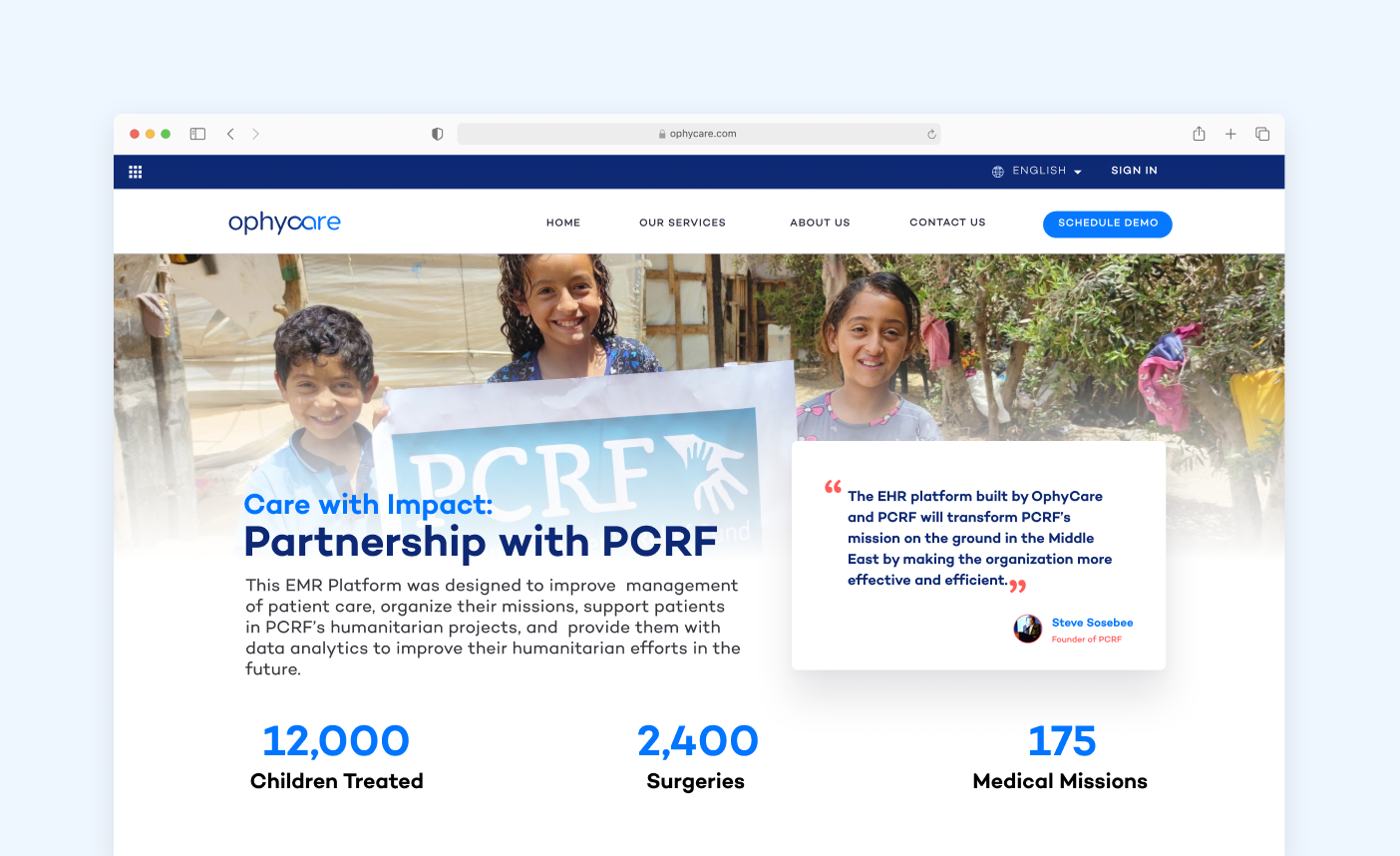OPHYCARE 2023
Redesigning OphyCare's website to align with humanitarian medical organizations


ROLE Lead Designer, Researcher
TIME Jan - Mar 2023
TEAM Angelina Fung, Aadit Narula Gupta (PMs), Raghad Alodibi, Manjari Madhusudanan (Research)
My team was paired to work OphyCare, a digital health startup, in my Design for Social Innovation course at Columbia’s School of International Public Affairs. We were tasked to develop a business roadmap for OphyCare’s transition from a B2C telehealth company into a B2B partnership with humanitarian medical organizations (HMOs).
As the designer of the team, I synthesized our market research to produce a proposed redesign of OphyCare’s landing page to reflect and encourage new partnerships with HMOs.


CONTEXT
By transitioning to a B2B model, OphyCare aims to expand its impact by partnering with humanitarian organizations that share its mission of providing healthcare to those in need. My team was responsible for identifying the best direction and ways to help OphyCare build these meaningful partnerships.
EXPLORATORY RESEARCH
OphyCare was interested in creating a cloud-based EHR system to manage patient data and conduct telehealth visits for medical missions
We began our initial research interviewing various HMO representatives and digital healthcare funders & investors to get an understanding of the current landscape of digital health infrastructure in HMOs.
Humanitarian medical organizations were pointing to their difficulties relating to constrained resources; not to technology. Furthermore, many noted lack of digital literacy that may also raise even more resource problems.
Our initial market research revealed EHRs were not seen as a funding priority for humanitarian aid orgs due to challenges of deploying them on-site during missions.
We dug deeper in our research and conversations with humanitarian organization representatives, on-site doctors, and digital health funders to learn what value EHRs could provide to HMOs.
OUR SOLUTION
Rather than thinking of OphyCare solely as an EHR platform, we transitioned into presenting OphyCare as a one-stop-shop equipped with features that address multiple needs of HMOs. We began thinking about potential features OphyCare could implement to incentivize onboarding of the platform.
In our second round of research, we learned that longterm care was still an area for growth for HMOs. This insight was key to positioning OphyCare as a critical tool for HMOs to transition from providing single-instance care to long term care for affected communities.
My redesigned website emphasizes OphyCare as a one-stop-shop specifically designed to aid humanitarian medical missions in achieving their goals and enhancing their impact.
I created this brief summarizing section to frame OphyCare as a platform that empowers the care HMOs already provide, highlighting OphyCare's EHR system as the key for humanitarian medical aid orgs to transition into providing longterm care and increase their impact.

In addition to providing a comprehensive overview of OphyCare’s features, I created individual sections that showcase the platform’s non-EHR capabilities to emphasize how OphyCare's platform specifically addresses the unique needs of HMOs.

I concluded the landing page with a brief case study of OphyCare's partnership with PCRF to show how the platform provides impactful and viable solutions.

My team and I handed off my redesign alongside a 50+ page report on our research findings to the OphyCare CEO and team. I learned what it meant working closely with a team in a business environment, with key lessons including...
My past projects have been focused on designing for usability, but this project was more anchored in marketing and strategy. I learned the importance of having a strong grasp of a company, and how I can effectively translate a brand into a website.
Learning that HMOs were not interested in adopting EHRs in the middle of our project timeline was a huge setback for my team. But this challenge allowed my team to critically reflect on our current research to reorient our approach and come up with a new, viable solution. I learned the powerful lesson of being open to challenges within the process, learning to use existing insights and resources to work through them.
Consistent checkpoints with OphyCare aided us in navigating our pivot and ensuring we had clear goals and objectives as we progressed through our journey.